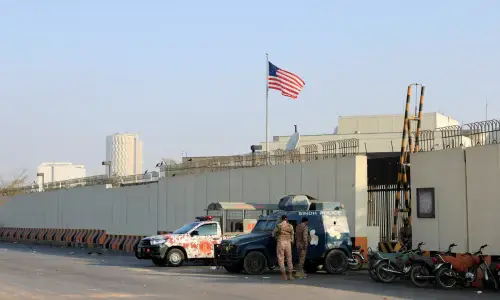LAHORE, June 6: A week before the end of its tenure, caretaker government had directed its law officers to maintain a firm stance in superior courts on cases about missing persons, terrorism and drone attacks in the Federally Administered Tribal Areas (Fata), Dawn has learnt.
In its May 29 directive, the government through the Ministry of Law and Justice asked all deputy attorneys general and standing counsel to stick to their “line of argument” before the courts.
The law officers were also asked to keep in mind legal ramifications of Article 245 of the constitution while contesting such cases. The said article deals with functions of armed forces.
The directive contained 16 points on which the law officers were required to base their arguments, including the powers of the federal government to call armed forces for acting in civil authorities in case of external aggression or threat of war.
It stated that the validity of any direction under Article 245 (1) could not be questioned in any court and the jurisdiction of high court under Article 199 was barred when Article 245 was in force.
It said all pending proceedings stood suspended till the time armed forces were acting in civil power. The government said there existed a grave unprecedented threat to the territorial integrity of Pakistan which fulfilled the parameters of Article 245 (1) of the constitution. It further said that the fundamental rights enshrined in the constitution were only available to persons loyal to state and obedient to the constitution and law.
The government said that the rights in Articles 3, 4 and 5 and the offence of high treason were segregated from the fundamental rights because Articles 8, 199 and 184 referred to rights in chapter 1 of Part II of the constitution and not the rights in Articles 3, 4 and 5.
It said immunity under Article 248 would not be available even to a prime minister if he or she was found acting contrary to the law. A prime minister under clause (2) of the Article 5 is bound to obey the constitution and the law.
It maintained that even in civil cases, an alien can sue under section 83 of the Code of Civil Procedure, 1908, and such aliens (if they were enemy aliens) needed permission from the federal government to sue in any court in Pakistan.
The directive further maintained that section 3 of the Security of Pakistan Act, 1952 empowered the federal government to detain any person who was attempting to act in a manner prejudicial to the integrity, security or defence of the country or attempted to commit any act leading to anti-national activity.
All persons who are subjects of a country at war with Pakistan will be alien enemy, including the Pakistani nationals who attack the state.
The directive stated that this line of argument would facilitate the courts in understanding the sensitivity of the issues and adjudication in correct perspective.





























